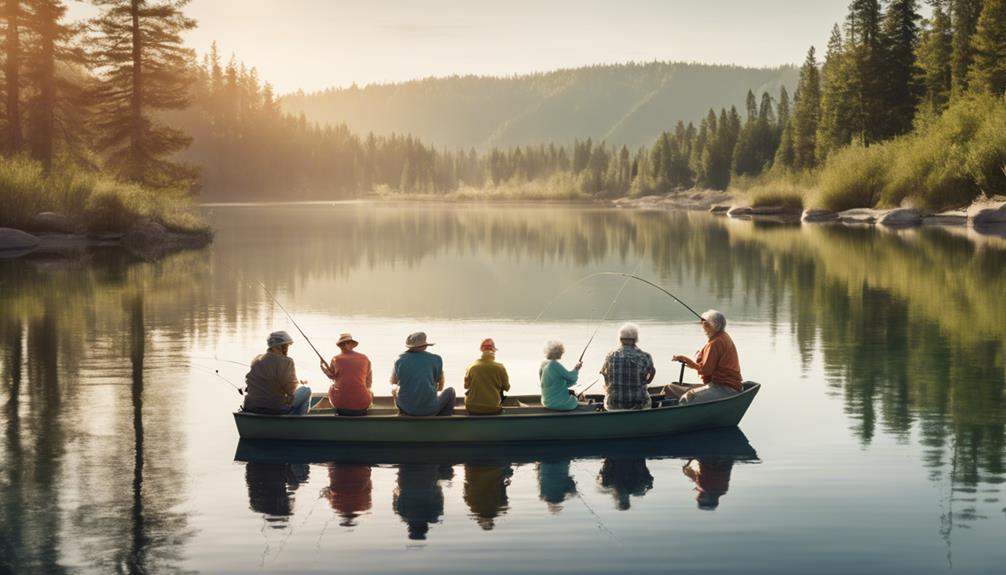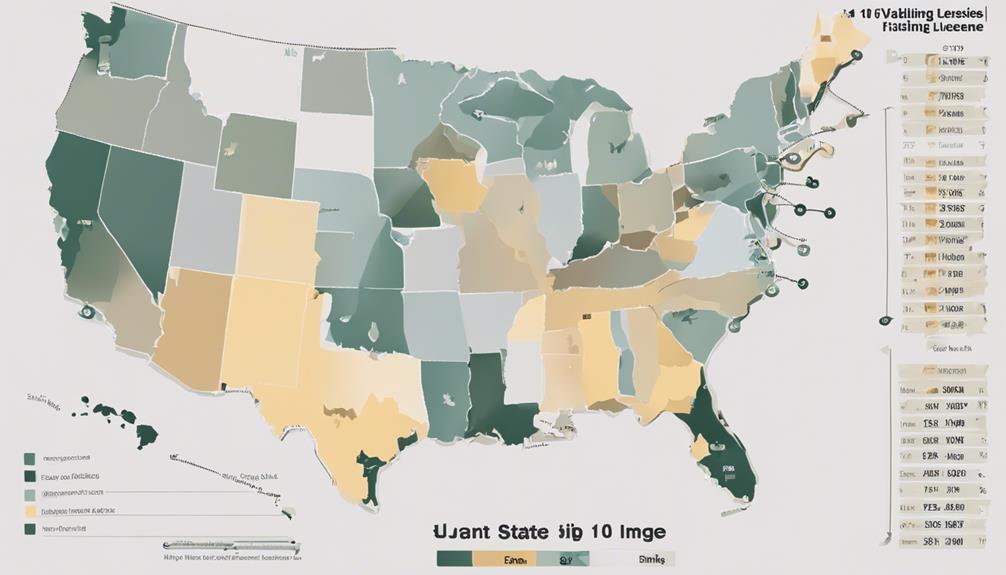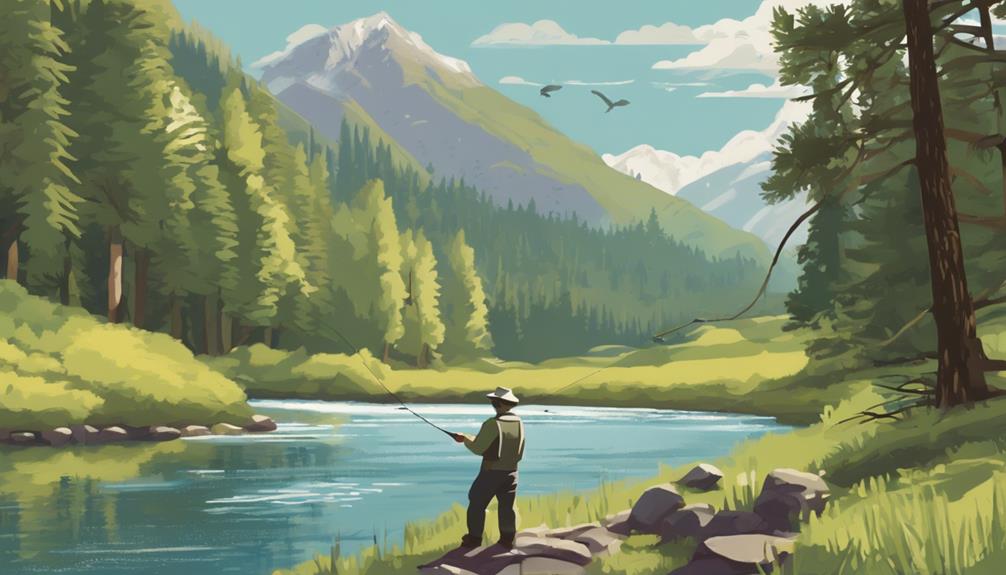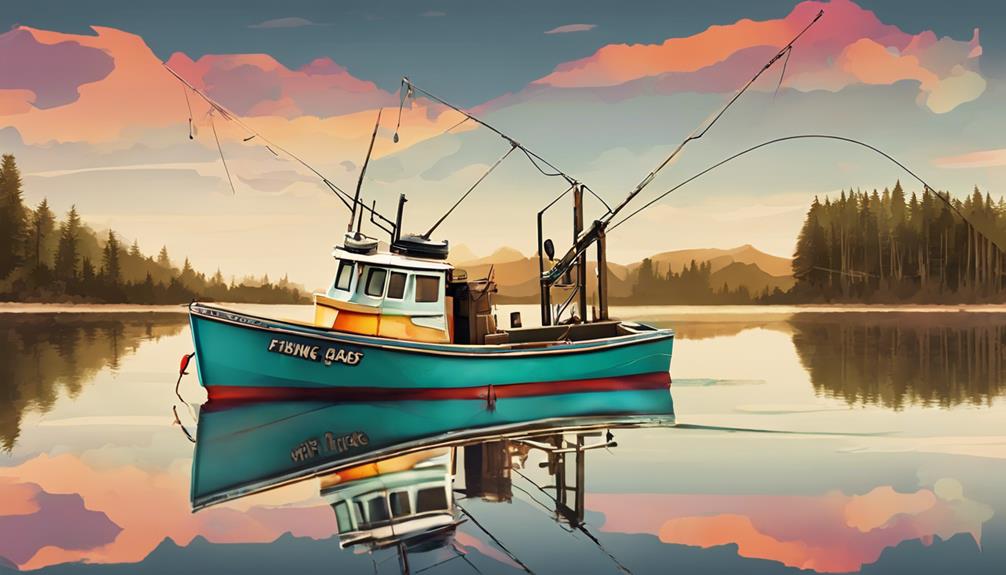Did you know that in the United States, there are over 30 different age limits set for obtaining fishing licenses across various states? Understanding these age limits is crucial for anyone looking to engage in fishing activities legally.
From federal regulations to special age-related fishing rules, navigating the age requirements can be quite complex. But fear not, as we delve into 13 key points that will help you grasp the nuances of age limits for fishing licenses, ensuring you are well-prepared for your next fishing expedition.
Different Age Limits in Various States
In various states across the country, fishing license age limits vary considerably. State variances can make it confusing for anglers, especially parents wanting to teach their children the joys of fishing. Some states have set specific age thresholds for when a fishing license is required, while others offer youth permits for those under a certain age.
For example, in California, children under the age of 16 aren't required to have a fishing license, making it easier for families to enjoy fishing together without additional expenses. On the other hand, states like Texas require all anglers 17 and older to have a valid fishing license, regardless of whether they're residents or non-residents. These state differences highlight the need for anglers to familiarize themselves with the specific regulations of the state they plan to fish in.
Understanding the youth permits available in different states is crucial for parents looking to introduce their children to fishing. These permits often have lower costs or even exemptions for young anglers, encouraging the next generation to take up this rewarding outdoor activity. Before heading out on your next fishing trip, be sure to check the age limits and permit requirements of the state you'll be fishing in to ensure compliance with local regulations.
Federal Regulations for Fishing Licenses
Federal regulations dictate who must obtain a fishing license when engaging in fishing activities in the United States. These regulations are set at the federal level but may have variations at the state level. While federal regulations establish the overarching framework, individual states can have their own specific rules regarding fishing licenses. It's crucial to familiarize yourself with both federal and state requirements before embarking on a fishing trip to ensure compliance with the law.
When it comes to youth permits, federal regulations generally require individuals under a certain age to obtain a fishing license. However, the exact age limit can vary between states. Some states may offer youth permits at a reduced cost or even exempt minors from needing a fishing license altogether under certain circumstances. Understanding the nuances of these regulations can help young anglers and their families navigate the licensing requirements more effectively.
Additionally, federal regulations may include provisions for family exemptions. These exemptions could allow for a single fishing license to cover all members of a household or provide discounts for families purchasing multiple licenses. By exploring these options, families can make the most of their fishing experiences while staying compliant with federal and state regulations.
Age Requirements for Youth Fishing Permits
When exploring youth fishing permits, understanding the age requirements is essential for ensuring compliance with licensing regulations. Youth involvement in fishing is encouraged as a way to foster a love for the outdoors and conservation efforts. Most states have specific age requirements for youth fishing permits, typically starting around the age of 12. However, these age limits can vary, so it's crucial to check with your state's fishing regulations to determine the exact age at which a youth fishing permit is needed.
Parental supervision is often a key component of youth fishing permits. While some older teenagers may be able to fish on their own with a permit, younger children usually need to be accompanied by an adult. This requirement ensures the safety of the child and compliance with fishing regulations. Additionally, parental supervision allows for valuable bonding time between the adult and child, creating lasting memories in the great outdoors.
Before taking a youth fishing, make sure to familiarize yourself with the specific age requirements and any accompanying rules for parental supervision. By following these guidelines, you can help create a positive and educational fishing experience for the young angler in your life.
Exceptions for Family Fishing Outings
Considering a fun day out with your family? Family bonding through fishing outings can be a wonderful way to create lasting memories and strengthen relationships. When it comes to fishing licenses, there are exceptions that allow for enjoyable family experiences. These exceptions often revolve around youth involvement and exemptions for younger family members who may not meet the standard age requirements for a fishing license.
Many states recognize the importance of family bonding and youth involvement in outdoor activities like fishing. As a result, they've implemented exceptions to age limits for fishing licenses specifically tailored to accommodate family fishing outings. These exceptions typically allow individuals under the legal age for a fishing license to participate in fishing activities when accompanied by a licensed adult family member.
The goal of these exceptions is to encourage family bonding and facilitate opportunities for younger members to experience the joys of fishing. By providing exemptions for family fishing outings, states promote the passing down of fishing traditions and skills from one generation to the next. This not only strengthens family ties but also instills a love for the outdoors and conservation in young individuals.
Age Restrictions for Saltwater Fishing Licenses
Age restrictions for saltwater fishing licenses vary depending on the specific regulations set by each coastal state. It's important to check the rules in your area before heading out to fish in saltwater. Here are some key points to consider regarding age restrictions for saltwater fishing licenses:
- Youth Participation: Many coastal states have special provisions to encourage youth participation in saltwater fishing. These provisions may include reduced fees or exemptions for young anglers below a certain age.
- Fishing Education: Some states require young anglers to complete a fishing education course before obtaining a saltwater fishing license. These courses aim to teach youth about conservation, safety, and proper fishing practices.
- Age Limits: While age limits vary, most coastal states have a minimum age requirement for obtaining a saltwater fishing license. This age requirement can range from as young as 12 to 16 years old, depending on the state.
- Accompanying Adults: In some states, young anglers below a certain age are required to be accompanied by an adult who holds a valid saltwater fishing license. This rule ensures that youth have proper supervision while fishing in saltwater areas.
Understanding the age restrictions for saltwater fishing licenses is crucial for young anglers looking to enjoy the experience while abiding by state regulations. Make sure to familiarize yourself with the specific rules in your coastal state to ensure a smooth and enjoyable fishing trip.
Benefits of Early Fishing License Acquisition
To maximize your fishing experience and ensure compliance with state regulations, securing your fishing license early offers numerous advantages. By getting your license early, you open up a world of opportunities for youth development and outdoor recreation. Engaging in fishing from a young age not only provides a fun and exciting pastime but also helps in developing essential life skills.
Early acquisition of a fishing license fosters a sense of responsibility and independence. It teaches you the importance of following rules and regulations, instilling a respect for nature and wildlife. Through fishing, you also gain valuable conservation awareness, understanding the significance of protecting aquatic ecosystems and marine life.
Moreover, starting your fishing journey early allows you to hone various skills, including patience, perseverance, and problem-solving. It gives you a chance to connect with nature, promoting mental well-being and reducing stress. The memories created through early fishing experiences can be cherished for a lifetime, bonding families and friends over shared adventures.
Managing Age-Related Fishing Restrictions
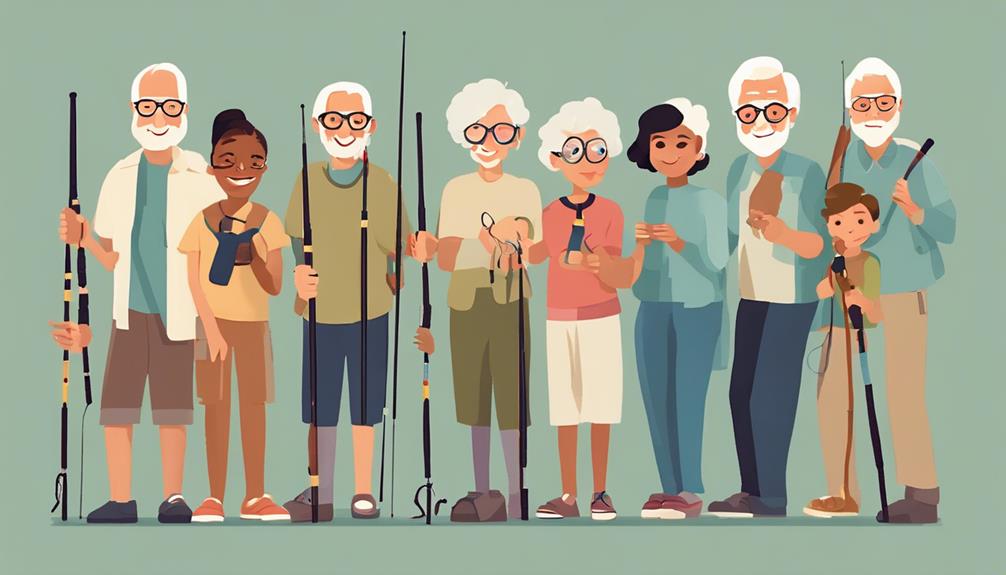
Navigating age-related fishing restrictions can sometimes pose challenges for anglers looking to enjoy their favorite pastime legally. Understanding the regulations and exemptions related to age can help you ensure compliance while still being able to fish to your heart's content.
Here are some key points to consider when managing age-related fishing restrictions:
- Age Exemptions: Some regions offer exemptions for certain age groups when it comes to fishing licenses. These exemptions often apply to senior citizens or individuals below a certain age, allowing them to fish without the need for a license.
- Youth Fishing Programs: Many areas have youth fishing programs or initiatives aimed at introducing young individuals to the joys of fishing. These programs often provide opportunities for children and teenagers to fish under specific guidelines tailored to their age group.
- Regulations: It's crucial to be aware of the specific age-related fishing regulations in your area. These regulations may dictate the minimum age for obtaining a fishing license or participating in certain types of fishing activities.
- Educational Initiatives: Some regions implement educational initiatives focused on teaching young anglers about fishing ethics, conservation practices, and safety measures. Engaging with these initiatives can enhance your fishing experience while abiding by age-related restrictions.
Understanding Special Age-Related Fishing Rules
When it comes to fishing regulations, staying informed about any special age-related rules can be crucial for ensuring compliance and enjoying your fishing experience to the fullest. One important aspect to consider is parental supervision. Many fishing locations have specific age requirements for children to fish without direct parental supervision. Ensuring that youth anglers are accompanied by adults not only helps in following the rules but also enhances fishing safety, providing a more secure environment for everyone involved.
In addition to parental supervision, understanding the opportunities provided through youth fishing educational programs is essential. These programs are designed to introduce young individuals to the world of fishing, teaching them about conservation, proper techniques, and the importance of respecting nature. By participating in such programs, young anglers can gain valuable knowledge and skills that won't only benefit them during their fishing endeavors but also instill a sense of responsibility towards the environment.
Frequently Asked Questions
Are There Any Age Limits for Fishing Licenses in Federal Waters?
In federal waters, there are age limits for fishing licenses. You can usually get one with parental consent if you're under the minimum age. Some states also require fishing education for younger anglers before issuing a license.
Make sure to check the specific regulations in your area to ensure you meet all the requirements before heading out to fish in federal waters.
How Do Age Limits for Fishing Licenses Vary Between Freshwater and Saltwater Fishing?
In freshwater regulations, age limits for fishing licenses can vary. Some areas may have specific age requirements for obtaining a fishing permit.
On the other hand, saltwater restrictions might also have their own set of rules regarding the minimum age for a fishing license.
It's important to check the regulations in your area to ensure you're compliant with any age limits set for fishing in both freshwater and saltwater locations.
Are There Any Special Age-Related Fishing Rules for Fishing Tournaments or Competitions?
When it comes to youth competitions, there are specific age-related regulations in place. Some tournaments may have age restrictions or requirements for participation. Parental supervision is often required for younger participants, and exemptions may be granted based on the rules of the competition.
It's important to check the guidelines of each fishing tournament to ensure compliance with any special age-related fishing rules that may apply.
Can Minors Fish Without a License if They Are Accompanied by an Adult With a Valid License?
Yes, minors can fish without a license if they're accompanied by an adult with a valid license. This exemption allows young anglers to enjoy fishing under adult supervision without needing their own license.
It's a great way for families to bond over fishing adventures while ensuring that minors can participate in the activity legally and responsibly. Make sure the adult has their valid license on hand to comply with regulations.
Are There Any Age Limits for Fishing Licenses for Individuals With Disabilities or Special Needs?
When it comes to fishing licenses for individuals with disabilities or special needs, accessibility accommodations are in place to ensure everyone can enjoy fishing.
Inclusive regulations typically exempt certain individuals from needing a fishing license due to their disabilities or special circumstances.
These accommodations aim to make fishing accessible to all, regardless of age or ability, fostering an inclusive environment for everyone to participate in this recreational activity.
Conclusion
Overall, it's important to be aware of the age limits for fishing licenses in your state and follow federal regulations.
Youth fishing permits and family exceptions can provide opportunities for young anglers to enjoy the sport.
By understanding and managing age-related fishing restrictions, you can ensure a safe and enjoyable fishing experience for all.
So, grab your gear, check the age requirements, and get out there to reel in some fish!
